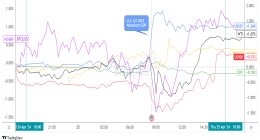BANKS could be forced to refund all fraud victims under new plans by the payments regulator, according to reports.
A consultation is set to begin shortly that will review whether victims tricked into transferring money to crooks should get mandatory refunds.
According to The Telegraph, the preferred position is for all victims to receive their money back, although other options are also on the table.
A source said: “There is a big push from the government to get this [consultation] started before the end of the year.
“It’s tired of banks wriggling out of their responsibilities. I believe the preferred option is that all victims get refunded.”
Currently, scam victims face a refund lottery, as it’s up to their bank to decide whether they’ll reimburse them for their losses.
A majority of banking giants, including Barclays, HSBC, Lloyds Banking Group and NatWest, signed up to a voluntary scam code in May last year.
How to protect yourself from scams
BY keeping these tips in mind, you can avoid getting caught up in a scam:
- Firstly, remember that if something seems too good to be true, it normally is.
- Check brands are “verified” on Facebook and Twitter pages – this means the company will have a blue tick on its profile.
- Look for grammatical and spelling errors; fraudsters are notoriously bad at writing proper English. If you receive a message from a “friend” informing you of a freebie, consider whether it’s written in your friend’s normal style.
- If you’re invited to click on a URL, hover over the link to see the address it will take you to – does it look genuine?
- To be on the really safe side, don’t click on unsolicited links in messages, even if they appear to come from a trusted contact.
- Be careful when opening email attachments too. Fraudsters are increasingly attaching files, usually PDFs or spreadsheets, which contain dangerous malware.
- If you receive a suspicious message then report it to the company, block the sender and delete it.
- If you think you’ve fallen for a scam, report it to Action Fraud on 0300 123 2040 or use its online fraud reporting tool.
It dictates how victims of bank transfer scams – also known as “authorised push payment (APP)” fraud – should be treated when it comes to refunds.
Victims will be reimbursed as long as they meet certain standards, but the code allows banks to deny a refund if they believe the customer’s own negligence led to the fraud.
As an example, you may be left out of pocket if your bank finds that you ignored scam warnings.
In fact, banks have repeatedly avoided reimbursing victims by claiming they should have been more careful before transferring their money.
In the first six months of this year, lenders returned 35% of stolen funds to victims, according to figures from trade body UK Finance.
Earlier this week, funding for the code was agreed for another six months until June 30, 2021.
However, UK Finance told The Sun it’s calling for new legislation to make sure scam victims are treated the same no matter which bank they’re with.
Requiring banks to refund all victims would avoid leaving customers out of pocket, but would also likely push banks to prevent fraud from happening in the first place.
In April last year, TSB became the first bank to promise refunds to all scam victims.
Katy Worobec, managing director of economic crime at UK Finance, said: “It is right that those who fall victim to these scams through no fault of their own should be compensated.
“However, over a year since its launch, the voluntary code is not working as intended, with a lack of consistency in customer outcomes and a lack of clarity for signatories in how they should implement it.”
She added that it would continue to work closely with the government to find a solution.
The Sun has contacted The Payment Systems Regulator, which will lead the consultation, for a comment.
It told The Telegraph it was keeping a close eye on banks’ behaviour.
A spokesperson added: “In the new year, we expect to consult on some of the other steps that may be required to make sure everyone benefits from the highest possible level of protection.”
Last year, NatWest initially refused to refund two fraud victims who were cruelly scammed out of a whopping £28,000 between them.
Meanwhile, landscape gardener David Hunt lost nearly £10,000 when scammers pretended to be from HMRC.
And grandmother Jo Wilson had her £40,000 life savings stolen after crooks pretended to call from NatWest.
This post first appeared on thesun.co.uk















